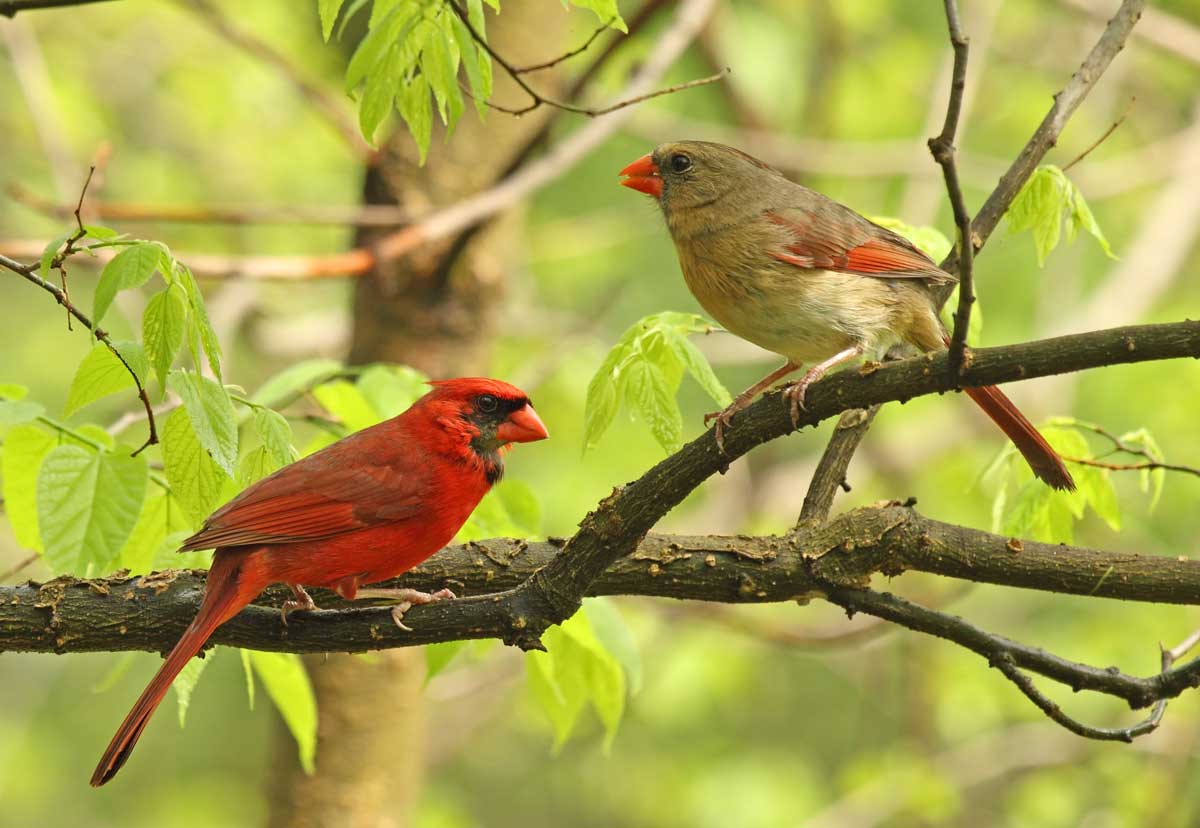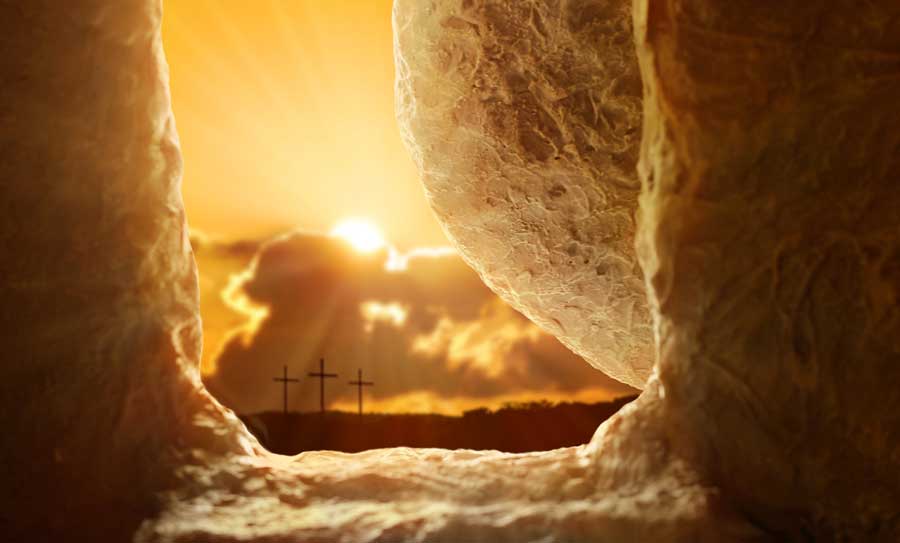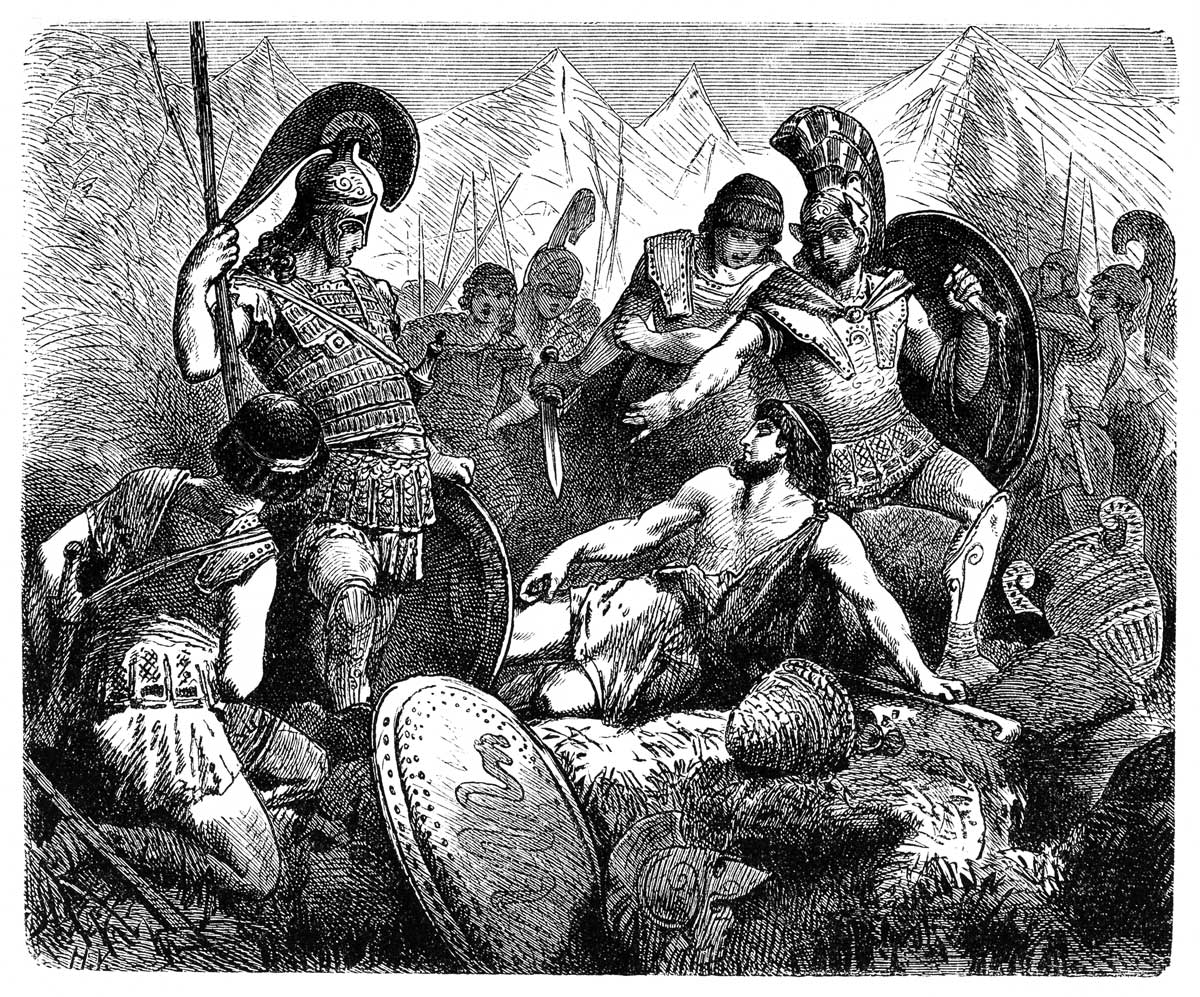Feature
Right Before Our Eyes
Life & Love Are Real Despite Theatrical Illusions
What little I have seen of reality, I owe to the eyes God gave me, and to his grace that opened them when I would have kept them shut.
In our time, Christians attract the hatred of everyone, because they are not wholly given over to unreality. They are the people who refuse to go along with an elaborate illusion. They dash cold water upon it; they sometimes have the temerity to laugh at the prancing, the fakery, the chintz, and the gold paint. They still remember, fitfully enough, the goodness of creation, and still see through, also fitfully enough, man's perennial attempt to be his own god and make for himself a paradise upon earth, flowing in many rivers from a bloody fountain at the center.
Jesus had hard words for the men who sought to kill him, not because he hugged his life close to his heart, but because what they really wanted to do was to kill the truth. The Pharisees boasted that they were children of Abraham, but Jesus gives them an altogether different parentage. "Ye are of your father the devil," he says, "and the lusts of your father ye will do. He was a murderer from the beginning, and abode not in the truth, because there is no truth in him. When he speaketh a lie, he speaketh of his own; for he is a liar, and the father of it" (John 8:44). Jesus has thus set the terms of the contest with a stark severity. He is from the Father, and he speaks what the Father tells him, in order to give men life; they are of Satan, and their speech murders the truth.
They are "hypocrites," a word that we should not rob of its dramatic significance. They are actors in a play staged for the eyes of other people. It is not merely that they like to pray on street corners and let their faces go unwashed when they are fasting, "that they may be seen of men" (Matt. 6:5). Their outward demeanor is a cloak over the inward reality, which is "full of ravening and wickedness" (Luke 11:39), or like the grass above "graves which appear not, and the men that walk over them are not aware of them" (11:44). Consider by contrast the relative shyness of the Lord, who is so often made uncomfortable by the crowds, and regularly retires to the mountains to pray. For mountains are real.
We might put together the two insights into falsehood, and say that Satan was the first actor on a stage, the first, as Milton says,
That practiced falsehood under saintly show,
Deep malice to conceal, couched with revenge.
The Smooth & the Slick
The Lord wishes to be sought; love will not be compelled, and what praise can man merit, if he is under compulsion? Hence our Lord is the Deus absconditus, as Pascal reminds us (cf. Is. 45:15). We must wait upon his revelation in love and respond to it in love. Satan by contrast conceals under the show of care, and entices the response of self-will. "And hath God said?" he asks, pretending to ignorance, and quite literally insinuating—gliding his sinuous way into the bosom (Latin: sinus) of Eve—a malevolence in God, and weakness too, as if God were the actor, putting on a show of greatness to overawe. That lie about God is an absurdity, as the sacred author has shown, because we have already seen God bringing the animals to Adam, as it were submitting to the man's insight into what each of them was and ought to be named.
Adam and Eve are "smooth" in the Hebrew, meaning they are naked, without our wrinkles and ruffles of clothing, while Satan is, in the Hebrew, "smooth" with a slight difference, "slick," "subtle." Adam and Eve have nothing to hide. Satan can do nothing but hide, and it is fit to note the happy coincidence that in the Germanic tongues "hell" (Hölle) is, in its inner meaning, the hollow place, a hiding-hole, a place of concealment.
Our human world is now not a garden thriving with trees, fruit, and "all sheep and oxen, yea, and the beasts of the field; the fowl of the air, and the fish of the sea" (Ps. 8:7–8). It is instead an un-world, a pseudo-world of noise and posing, of the kind of self-showing that hides; it is all "politics," what Malcolm Muggeridge many years ago called the "Legend," bright and hot with stage lights and reporters, mendacious and murderous at once.
Witness the sinuous mental feints and stabs we must make in order to persuade ourselves that it is a good and brave thing to kill the unborn child whose existence is owing to our own prior and voluntary action, action that is sinuous in its own right, too; we use the body to tell a lie of passion, and then deliver the child over to the cold lie of the knife, as if he were a wart or a tumor.
Witness the staggering incoherence of believing at once that there is no difference between a man and a woman, and that a man can be a woman in a man's body. It is a refusal to see what is in front of the eyes. Richard III saw that "sin will pluck on sin," so that when we tell one lie, we must tell other lies to shore it up. In this sense, the lie involves us in an inverse creation. Just as one truth opens itself out to others, as a bud breaking into flower, so that the more you see, the more you glimpse what is about to show itself on the horizon and the more you apprehend what is beyond your field of vision, so does the lie fold itself inward in a progressive collapse, requiring lie upon lie, until your mind is entirely devoured by it. If you are possessed of natural intelligence and talent, you may produce perfectly demonic art and works of powerful undoing, for hell has its contemplatives as does heaven.
Our Great Ally
In this state of affairs, the Christian must fight to keep his secure footing. He must take seriously the disease that his neighbors suffer, because merely to laugh at it, while sane enough and likely to protect a few vulnerable people from entering the play in earnest, is not sufficiently charitable. But he must always remember that the disease is like a cloak without a real character underneath. It is an un-being. We do not want to strut and fret more finely than Satan does. One hypocrite might as well be another.
We do have a great ally, one that we should never overlook. It is "heaven and earth, the sea, and all that is in them" (Ex. 20:11). The creatures roundabout us do not act, but simply are, as God made them to be. And since other human beings themselves are creatures of God, they too, in their nature, fallen though it is, can speak the truth to us.
I see the cardinals fluttering about the fir tree outside. They are, in reality, of a breathtaking complexity and beauty, by contrast with which the most staggeringly vast system of stars, without such things as cardinals, is but a flash and a glare. They are alive. They are more than the collision of random particles in empty space. The latter, in itself, without the laws by which God has determined to bring real things, animate and inanimate, into being, possesses neither stability nor the quality of change; by itself, the collision of random particles in empty space is neither this nor that, neither here nor there. The cardinals are, and are alive to boot.
The unborn child in the womb is alive. That is reality speaking to us, of itself and of God, "for the invisible things of him from the creation of the world are clearly seen, being understood by the things that are made" (Rom. 1:20). We must be hypocrites of ignorance not to see it. The child is not dead. It is not inert, like an acorn on a sidewalk. It is not inanimate, like an accretion of coral. It is not a parasite, like a tapeworm. It is not a part, like a finger. It is not a corruption, like a cancer. It is what it is, what we would certainly declare it to be were it not for our desire to pretend. It is nakedly a child in the womb. The snake would have us cloak it in garish abstractions and dodges, so as conveniently to make away with it.
The cardinals against the white of the snow are male and female. The male is that bold crimson that is so rare among the birds, with a jet black countenance and a bright yellow-orange bill, a finch's bill, good for cracking seeds. The female is a more delicately colored red and woody brown and gray. Male and female are almost always to be seen together, and though the male makes a prominent display of his song, the female sings too, a loud and cheerful song, unmistakable. There is no half-male or half-female. There is no "spectrum" for the cardinals. You know immediately which adult is male and which is female. The sexual dimorphism is obvious and significant and, we Christians believe, profoundly good, as is the division of birds into species.
The Beautiful Union
It would be quite mad, then, to be happy that there were male and female cardinals, but not happy to find that same double form in man—a distinction meant to be bridged in that beautiful union known as marriage. For we believe that man and woman are for one another as the male and female cardinal are for one another. Far from marriage being a mere social construct, it is the foundation of society itself. Says Milton:
Hail wedded Love, mysterious Law, true source
Of human offspring, sole propriety
In Paradise of all things common else.
By thee adulterous lust was driven from men
Among the bestial herds to range, by thee
Founded in reason, loyal, just, and pure,
Relations dear, and all the charities
Of father, son, and brother first were known.
This is grand poetry, but also the plain truth. So also when the Lord speaks, dispelling our facade of liberality when it comes to divorce:
But from the beginning of the creation God made them male and female. For this cause shall a man leave his father and mother, and cleave to his wife; And they twain shall be one flesh: so then they are no more twain, but one flesh. (Mark 10:6-8)
When man and woman unite, they do in fact make "one flesh," a single organism in the act of bringing new life into being. A dance or a conversation is distantly similar to it in one regard, that it requires two people, but it could be any two, or three or more; but nothing in human experience is in any sense in the same category with the congress of the sexes. Nothing is like it. That is not mysticism. I need not consult Julian of Norwich to learn of it. It is a biological fact.
The man and woman bear to one another their own history and, summed in them, the physical and spiritual history of their ancestors extending far into the immemorial past. All acts that mimic this one, for epidermal excitation, or romance, or worse inanities of the soul, are in plain biological and anthropological fact nowhere near it. There is no such thing as half-intercourse, as there is no such thing as half an organism; half an organism is none at all. The mock intercourse is a staged thing, a play, a pretense. It is a flashlight and a rattle of tinfoil pretending to be a thunderbolt.
So also it is a play, a pretense of a different sort, when a man and a woman become one and not-one in fornication, one in the body, but not-one in their intention. They, too, are hypocrites, that is, actors, pretenders. They must pretend to a passionate union they deny by their neglect to marry first, and by their turning away from the obvious reality of what they are doing. They are making a child, and pretend to great surprise and dismay when the child arrives.
The Adventure of Life
The cardinals flourish when they live and have many chicks. They search for food, they build a nest, they breed and they feed their offspring, they try to protect them against the hungry hawk or jay, they train them when they are but scruffy adolescents, and then, if they need, they roam far south for a milder winter and more plentiful food. It is the adventure of life, of "the grass of the field, which today is, and tomorrow is cast into the oven" (Matt. 6:30), which we are now wealthy enough to pretend is not our adventure also.
When I see children happily running about, as I often do at Thomas More College, where I now teach, because the smog of lawyers has not descended upon us, I am immediately cheered. That is not because I am a good human being, but because I am quite simply human, good or not. I am sure that the neurologists will soon tell us what the physical correlate of this feeling is, for what that is worth. Yet I am not cheered by the sight of grown human beings going about grim and harassed to their subway stations. Mr. and Mrs. Cardinal see the fruit of their labor in the pretty chicks, and not in some great gray tree to conquer. Why do we work, if not in the first instance for the nest?
But the cardinals have their lives of a few years, and they pass away. We do not merely do so. Even human tribes without writing do not do so. We are not simply "more complex" than the cardinal. We are those creatures whose minds dwell in a fashion that is to the cardinal's as the spangled heavens are to a piece of cardboard with holes pricked in it. Or the reverse indeed: we are the creatures that can represent the spangled heavens by that piece of cardboard. We enter into and pass out of the dimensions. No created thing can "contain" the mind, a fact even children prove in their wild and searching imagination. Every child will utter sentences never uttered before, perhaps never imagined before, and their parents will understand them, or at least glimpse their meaning from the havens of long habit and inattention to this world of wonders. This also is not mysticism. It is a fact.
The cardinals have a past. We have history. The cardinals remember. We recollect, we memorialize. The cardinals anticipate the near future. We look forward to the time beyond time. Atheists who posit an alternate universe whereof by definition they can never have any evidence unwittingly give us a strong argument against their own materialism. Even they cannot be trammeled up in the coop. They may aspire to be robots when they grow up, but alas, they are condemned to greatness nevertheless.
The cardinals warble away when their friends the finches and sparrows have found some good seeds, and I am sure that it feels "right" to them to do so, though it would require the most strenuous act of the imagination for us to put ourselves behind their bright eyes. But we are the only creatures who conceive of the rightness, separable in part from the specifics of the situation. We, too, have been made to thrive on the right and to sicken on the wrong. Every poet of any perception, across all cultures, has seen it. Turn against your own flesh, and expect to thrive? Allow me to introduce you to the elder daughters of King Lear. Break an oath, and get away with it? Tell it to Richard III. Fornication is a mere pastime? "The expense of spirit in a waste of shame / Is lust in action," says Shakespeare. He is not expressing an opinion. He is noticing a fact. That mushroom is bad.
And virtue? A power, a beauty. What does it mean to be a "good" cardinal, but to fulfill the powers that are definitive for the kind of creature a cardinal is? And man is what, exactly? That being for whom good and evil are the terms of a lifelong struggle; for whom the passage of time runs athwart thoughts and aspirations that cannot be held to time at all; who has found words, and names all the creatures that are, and the innumerable creatures of his imagination that have never been; who is blessedly wise at four years and blessedly foolish at fourscore; who knows of male and female and why they are beautiful; who not only lives but who can honor life in all its forms; who exists and who knows he does. The conceptus itself is that kind of being, its powers latent but in the process of unfolding, and that, too, is a biological fact.
Disguising Our Native Royalty
When we pretend that we are not what we are, then, it must be a shabby substitute. We are like kings and queens smearing ourselves with makeup and prancing about in polyester and rhinestones, calling ourselves gods or beasts or sometimes both at once, and forgetting our native royalty. "Do ye not know that we shall judge angels?" says Paul (1 Cor. 6:3). Instead we flounce and swagger along the broad highway to nothingness, unless the grace of God should snatch us away from the lies we love. I will conclude with Milton, describing how Adam and Eve felt when they awoke from the fantasy of the apple and the soporific lust they indulged in to seal their guilt:
Up they rose
As from unrest, and each the other viewing,
Soon found their eyes how opened, and their minds
How darkened; innocence, that as a veil
Had shadowed them from knowing ill, was gone,
Just confidence, and native righteousness,
And honor from about them, naked left
To guilty shame: he covered, but his robe
Uncovered more.
May the good Lord who was stripped on the cross relieve us of all our troublesome disguises, that we may be naked again, as the child in the womb.
Anthony Esolen is Distinguished Professor of Humanities at Thales College and the author of over 30 books, including Real Music: A Guide to the Timeless Hymns of the Church (Tan, with a CD), Out of the Ashes: Rebuilding American Culture (Regnery), and The Hundredfold: Songs for the Lord (Ignatius). He has also translated Dante’s Divine Comedy (Random House) and, with his wife Debra, publishes the web magazine Word and Song (anthonyesolen.substack.com). He is a senior editor of Touchstone.
subscription options
Order
Print/Online Subscription

Get six issues (one year) of Touchstone PLUS full online access including pdf downloads for only $39.95. That's only $3.34 per month!
Order
Online Only
Subscription

Get a one-year full-access subscription to the Touchstone online archives for only $19.95. That's only $1.66 per month!
bulk subscriptions
Order Touchstone subscriptions in bulk and save $10 per sub! Each subscription includes 6 issues of Touchstone plus full online access to touchstonemag.com—including archives, videos, and pdf downloads of recent issues for only $29.95 each! Great for churches or study groups.
Transactions will be processed on a secure server.
more on theology from the online archives
more from the online archives
calling all readers
Please Donate
"There are magazines worth reading but few worth saving . . . Touchstone is just such a magazine."
—Alice von Hildebrand
"Here we do not concede one square millimeter of territory to falsehood, folly, contemporary sentimentality, or fashion. We speak the truth, and let God be our judge. . . . Touchstone is the one committedly Christian conservative journal."
—Anthony Esolen, Touchstone senior editor












